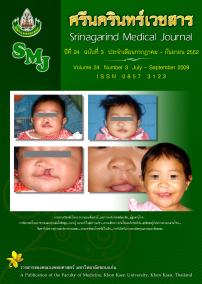ThaiScience
ThaiScience
SRINAGARIND MEDICAL JOURNAL
Volume 35, No. 03, Month MAY, Year 2020, Pages 320 - 325
Quality of life among persons with prostate cancer
Lalida Noppakun, Rujadhorn Indratula, Nuttamon Vuttanon
Abstract Download PDF
Background and Objectives: Cancer and its treatment often negatively affect patients’ quality of life (QOL). A study of QOL among persons with prostate cancer may help healthcare professionals in making an appropriate care plan for promoting patients’ QOL. This research aimed to explore quality of life among persons with prostate cancer and to compare their QOL classified by age, educational level, staging of disease, and treatments. Methods: This cross-sectional descriptive design recruited 127 participants from persons with prostate cancer admitted at a university hospital between January and June 2017. The research instrument used was a set of questionnaires, which consisted of the Demographic data questionnaire and the Functional Assessment of Cancer Therapy-Prostate-Thai questionnaire (FACT-P). Data were analyzed using descriptive statistics and the Kruskal-Wallis test. Results: The mean score of an overall QOL among persons with prostate cancer was at a high level (120.78±14.72). Based on the test, the participants receiving chemotherapy had an overall significantly different QOL from the participants treated with other methods (p=.039) by accounted was at a moderate level (100.33±19.22). Considering each aspect, the mean scores of QOL in physical wellbeing aspect and cancer specific aspect were at a moderate level (17.67±4.04, 28.00±4.59, respectively). Conclusion: The result of this study revealed that the participants receiving chemotherapy had an overall QOL less than the participants treated with other methods. This finding suggests healthcare professionals should focus on care planning in order to reduce symptoms in persons with prostate cancer undergoing chemotherapy to improve the patients’ QOL.
Keywords
Prostate cancer, Quality of lifeSRINAGARIND MEDICAL JOURNAL
Published by : Faculty of Medicine, Khon Kaen University
Contributions welcome at : http://www.smj.ejnal.com/e-journal/journal/index.php
